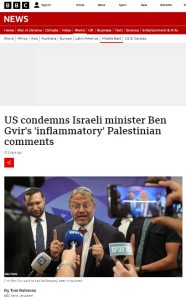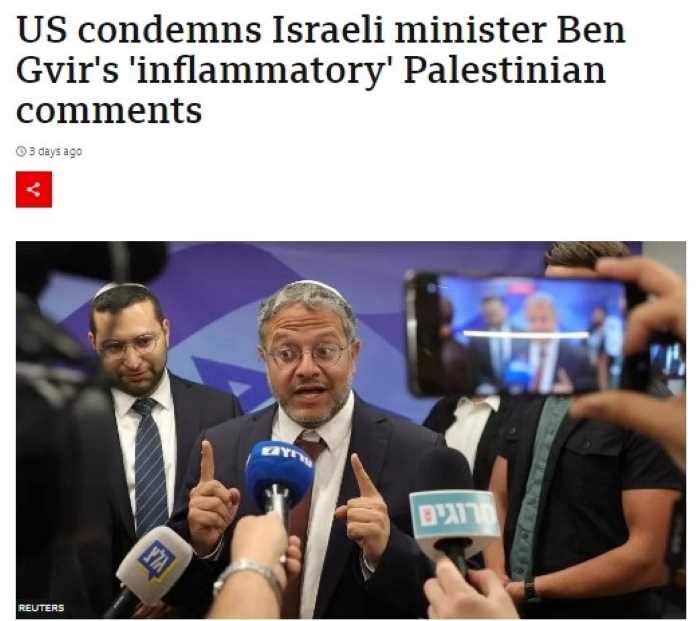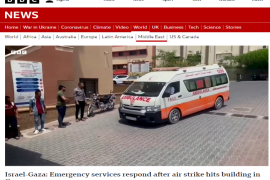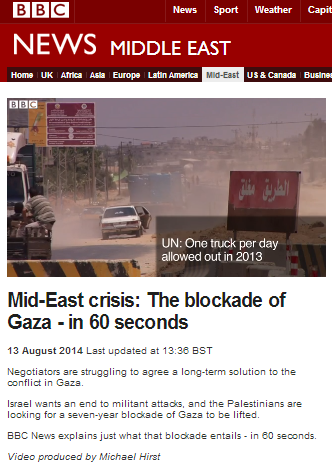A report by the BBC Jerusalem bureau’s Tom Bateman which appeared on the BBC News website’s ‘Middle East’ page on August 25th under the headline “US condemns Israeli minister Ben Gvir’s ‘inflammatory’ Palestinian comments” includes a particularly remarkable example of the use of the ‘Israel says’ formula which is regularly – but often redundantly – employed by BBC journalists:
“Palestinians in the West Bank already endure severe restrictions on the right to movement, including being unable without permits to freely travel to Jerusalem or their ancestral lands inside Israel. The Israeli authorities say this is done for security reasons.” [emphasis added]
In order to write that paragraph, Bateman had to erase several factors from the picture he presented to BBC audiences worldwide.
First is the fact that “Palestinians in the West Bank” are not Israeli citizens and therefore do not have “the right” to “freely travel” in that country, including its capital. Secondly, and relatedly, Bateman erases from the picture the Oslo Accord agreements – signed by the PLO as the representative of the Palestinian people – which state in Article IX that:
“Entry of persons from the West Bank and the Gaza Strip to Israel shall be subject to Israeli laws and procedures regulating entry into Israel, and residents of these areas shall be required to carry the identity card as agreed upon in this Agreement, as well as documentation specified by Israel and notified through the CAC to the Council.
The provisions of this Agreement shall not prejudice Israel’s right, for security and safety considerations, to close the crossing points to Israel and to prohibit or limit the entry into Israel of persons and of vehicles from the West Bank and the Gaza Strip.”
In other words, the PLO agreed to clauses limiting travel from areas under Palestinian control into Israel nearly three decades ago.
The same agreement goes on to state:
“The Palestinian Police shall set up checkpoints in areas under its security responsibility on roads connecting the West Bank and Israel, for the purpose of inspection and identification of Palestinian vehicles and passengers in order to prevent illegal introduction of weapons into or from Israel.”
That clause of course relates to the issue of Palestinian terrorism which Bateman completely erases from his portrayal, failing to note that security measures had to be augmented during the second Intifada. As noted by WINEP in 2004:
“Between October 2000 and July 2003, the date of completion of the first phase (known as Stage A) of construction of the [anti-terrorist] fence along Israel’s northwestern rim of the West Bank, thirty-five “successful” suicide attacks have originated from the northern West Bank alone. Specifically, twenty-one of the attacks originated from Jenin, and fourteen from Nablus. Those attacks caused the murder of 156 Israeli civilians. The attacks from Jenin resulted in the deaths of ninety-seven Israelis. Among those attacks was the March 31, 2002, attack in Haifa, where a Hamas bomber blew himself up in the Matza restaurant. Fifteen Israelis were killed and 131 injured. Those attacks also included the June 5, 2002, attack at Megido junction, in which a Palestinian Islamic Jihad bomber blew himself up in a car bomb while crashing into an Egged commuter bus. Seventeen Israelis were killed and forty-two injured.)”
Likewise, Bateman ignores much more recent attacks originating from PA controlled areas such as the one on March 9th 2023 in Tel Aviv in which three civilians were wounded – one of whom later died – in a shooting attack perpetrated by a Hamas terrorist from Nil’in which was not reported by the BBC.
Bateman even failed to mention another fatal shooting attack in Tel Aviv – which did not receive any stand-alone coverage from the BBC – that took place just twenty days before his report was published and was perpetrated by a Palestinian Islamic Jihad terrorist from a town near Jenin.
This is of course by no means the first time that BBC journalists – including Bateman himself – have promoted a one-sided narrative concerning “restrictions on the right to movement”. Any reasonable explanation of that topic could not possibly exclude the lethal terrorism which has made such restrictions necessary and the trite use of the ‘Israel says’ formula in order to tick the impartiality box clearly does not meet the BBC’s supposed standards of accurate and impartial reporting.
Related Articles:
BBC NEWS PORTRAYS COUNTER-TERRORISM MEASURE AS ‘COLLECTIVE PUNISHMENT’
BBC’S BATEMAN CONTINUES TO AVOID CRUCIAL CONTEXT TO TERRORISM






Simple fact – Bateman is a liar (by omissions) and is therefore an ideal person to work for the BBC – and I am forced to pay £159 pa to read his garbage..